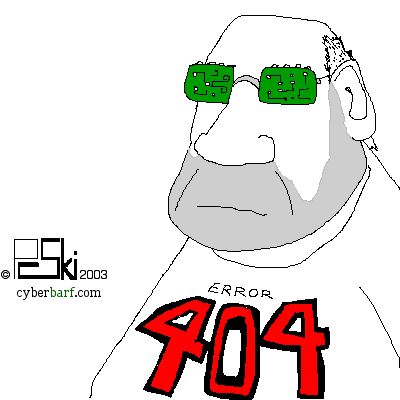cyberbarf
EXAMINE THE NET WAY OF LIFE
Short Quick Steps
My five year old niece comes to my office on a regular basis. One of the routine things to keep her occupied is letting her have-at-it on one of the iMac computers. Today, all she really asks is that the computer be turned on and that I type in one of her favorite sites in the URL. She has mastered the movement of the mouse, and the concept of point-and-click. On her own, she has found the games and activity pages of her favorite sites. She also found a way to link to other sites. She also has learned that name brand sites like Barbie, Disney and cartoonnetwork constantly update their sites so some of her favorite activities sometimes get dropped. However, she has found that the her old lost activities on an international Barbie site. Without prompting, she figured out how to print pages. How did I find out? There were a dozen or so cartoon character coloring pages in the network printer tray. So, at age five, she is has no fear of navigating around a computer. She does not even get frustrated when a game cannot load because a plug-in is missing, or that the browser suddenly freezes. A quick call to her uncle, me, and she is back on in less than thirty seconds. She knows how to spell her name. She now likes to type in the letters into the URL box as I spell them. I think now I will be obsolete in a year. Sometimes, she needs me to read the instructions on a new game or a title of a story.
When she was three, she equated the computer screen with a television. She did not know or want to move the mouse around; she had her doting uncle to do that for her. She would want to see her cartoon shows, like the Power Puff Girls. So, I would type in and navigate the cartoonnetwork.com site. She would recognize the other characters, too. Sometimes she would just name a character or story, and a quick internet search would find something or someone's fan's page. The other thing she like to do was get a paint program page and scrawl, bucket fill and erase the page over and over again.
Then when she was four, she was into Barbie web sites. Barbie is a constant merchandising peer pressure. The activities centered around school, crushes, dating and fashion. No wonder kids grow up faster these days.
Every day she does something on her own. She knows on to get to her games, music and activity pages within a site. She knows nick.com and nickjr.com are different sites. When she wants to go somewhere else on the web, she asks me if I can type in “www.playhousedisney.com” or “www.myscene.com.” She stresses the w's and the dot-com. She found the computer volume control. Now the characters speak to her. There is background music as she goes on her business of clicking. So long as it is not too loud, there is a happy medium.
She is also learning on to handle different type of interface games. Some activities require just the mouse to move the game piece. Other games require the arrow keys, or the space bar to navigate. She is actually pretty good at one game of topping off fast food orders on an assembly line or building burgers a la Tetris. Maybe it is a subliminal training for a teen's early high school summer jobs. But it is clear that she has progressed in how she interacts with technology; that she can understand the basic operating instructions of the Internet; and that she is not afraid to use a computer. Those are life tools that she is learning at an early age. A young child is a sponge for knowledge.
But when she has run through all the games and pages, she does go back to the childhood basics. She asks her uncle for blank paper and crayons and some quality time drawing toys, animals, people, places and things.
Why Listen At All?
With all the litigation about music downloads, copyright infringement suits, and blanket subpoenas on telecom companies by the RIAA, the basic question that is never raised in these discussions is why do we listen to music in the first place?
Music is a universal component of all human cultures and society. But the beginnings of music is not well documented and it has only been recently explored to its origins. It is still not clear why music developed into what we hear today.
All events of man can be classified into four basic categories of behavior: eat, drink, procreate and rest. One theory believes that music may be an off-shoot of primitive “birdsong” or animal behavior as a way of stalking and hunting prey by luring the animal closer to the group's position. Or it could have been learned behavior-- watching other animals communicate by cackles and warning signs. Humans applied this knowledge and adapted it using rudimentary logic to communicate between themselves during the hunt, thereby covering more ground and making it easier to capture food.
Even current hunters feel that they become one with nature during the long time in the field waiting for a strike. They learn the telltale signs of animal trails, scent on the wind, where animals breed or feed, and where to wait under the cover of brush.
After a lightning strike, primitive man may have found that cooked meat was easier to digest than raw. They learned to capture fire and use it as a tool. They also could have learned that guttural sounds could also be used as a tool to communicate basic emotions or commands in their highly dependent, self sufficiency bands.
It may also be as simple as being accustomed to the noise in one's own environment. The jungle and forest sounds or the insects, birds or the wind change during the day and night. A natural orchestra of different instruments probably could be heard at any moment. People get used to sounds around them. In your own home, the creaking sounds of the roof rafters, or the drips in the gutter during a light rain, or the noise of the furnace firing its cycle, do not disturb your sleep because you are used to them. However, if you are spending a night in a new, strange place, the noises are differently and it takes time to adjust to them. Sometimes, the loud, strange sounds or sudden noises lead to unrestful sleep.
HOLIDAY SHOPPING IS HERE:
New pinderWear Tees on Sale Now!!!!
New Real News merchandise!!!!
New cyberbarf Cap!!!!
Another theory on music believes that the bio-neurologic brain activity is similar to mathematical problem solving. One could equate that music and math/problem solving may have had a similar historic root in primitive times. It is possible that music increased the logic transmitters in the human mind or created pathways like modern computer programs create nodes and modules through subroutines.
People have always multitasked when doing routine tasks. It is easy to understand a man humming a tune while whittling a stick or making a spearhead. It is easy to understand a woman humming a tune while washing cloth on the river rocks. It was early mental exercises during routine, mundane tasks.
If early man was aware that he could control noises like the animals around him, he could manipulate them to his advantage. He could use the volume or tone to show emotion, leadership, or displeasure. He could use noise to scare off predators. In combination with hand festers, a simple form a communication between tribe members could easily be created and understood. Through this interaction, working in groups, the need would have arisen to communicate to others what the leaders had learned. What rocks made good spearheads; how to capture a prey; where to build camp; where is good water. Communication needs to be understood but also remembered in order to have lasting value.
Nursery rhymes. Even as adults, we remember them. It is a part of our lives. It is a part of our generation's oral history. Rhymes are easy to remember than complex textual passages. Music may have been the first means of creating an oral history to be passed from generation to generation in order to increase their chances of survival. It must have been found to be a powerful tool. We still use music rhymes to quiet crying infants. We use music or lyrics to impress the opposite sex. We use music on dates and to celebrate good times. We still use background music to create a peaceful mood prior to falling asleep at night. This may have been the foundation of creating a society's culture, a shared vision of thoughts, ideas and customs.
In today's society, music is in the background of everyday events. In an office, in an elevator, at a restaurant, in a store, in a car, in a bar, or during a movie. But the real test of music today is that it “marks” the times in people's lives. The key events of our lives are marked by the background music we listened to at the time: in high school, your first concert, weddings to funerals. Music always seems to be lurking around us, like the sounds of the primitive forests. Modern music may be a substitute for the sounds that surrounded primitive man. We use music in the background of our daily work routines. We use it to relax after work. We incorporate the sounds and lyrics over the spectrum of human behavior. Music could have the purpose as acting as an equilibrium balance between our unconscious mind when we are processing tasks in our conscious mind. Music could be the trigger mechanism for the last function of man: rest.
So with all the noise of who owns or who should control music on the Internet, there is still the open question which has no clear explanation: why do we listen to music in the first place? If we can answer that complex question, the matter of royalties would seem de minimis.
Suit Suits
When Suits sue Suits, the average casual Joe sits on the sidelines and watches. But with the SCO v. IBM battle over the latest version of Linux, everyone seems to have an ripe opinion on the subject. This is another case where a successor had the technology for networking protocols and failed to implement any sort of business plan but for general licensing the technology to others who over time developed it into a meaningful product. It is like Xerox who at their California R&D center had created all the functions for the modern day office: the mouse, the GUI interface, printers and the computer hardware to interact with all these devices. But since it did not fit into the copier business, all the research was let go, and the seeds of Silicon Valley were planted.
Companies, with the economic and tech slowdown, are in need to grow quarterly earnings and make positive news to feed their Wall Street analysts to prop up stock prices. So they have sent their teams through their warehouse files in search of viable patents so they can sue anyone they claim have infringed on their intellectual property rights.
This is a high risk low reward business plan. IP litigation is the most costly form of legal bloodsport in America. The stakes are higher than letting the casino's full capital ride on hitting a hard eight at the crap table. The results are nuclear: winner take all. You either have valid property rights or you do not. Part of the problem lies with the Patent Office that granted patents for simple user interface techniques or combinations like one-click processing payments on-line. If there is prior art, or the methodology already exists in the public domain or industry, the technology is not patentable. A liberal use of these computer technology patents has put thousands of quills in the legal bows of tech companies on the prowl for license fees.
Another part of the problem is that in the early days tech companies swapped cross-licenses with each other like kids trading baseball cards on the playground. It was the thing to do at the time. The ramification is that there are multiple versions of software code that are in the public domain, and other versions that are claimed proprietary. In the casual free cross-licensing era, no one may have thought ahead about derivative programs. Thus, a huge gray area is created in these competing arenas. And legal sharks love to swim in the murky waters of the gray area looking for easy or weak targets.
In the jerk SCO sharks took a bite at something, but it turned out to be a bigger shark, IBM. For decades, IBM has been the leader in obtaining patents for technology. The corporate culture is to create new technology, improve old technology, and implement the new technology in products. IBM knows how to manage its patent portfolio.
The open source community is siding with IBM because part of the defense is that open source community's general public license for UNIX is at stake. Once a public license is out for all to use, the open source community believes their use of it in derivative products is protected against charges of infringement from a predecessor software version.
HEY cyberbarf FANS!
NEW SPECIAL
T-SHIRTS ON SALE
FOR MEN & WOMEN
AT THE PINDERMEDIA.COM STORE
Also available The Real News Journal, Mugs, Caps and other merchandise that sends a Message.
End Notes
Random mental brainstem discharges:
Western tech bureau chief Rocky has refocused his time away from television reruns. He is now channeling his frustrations through the latest version of The Sims. He is taking out his frustrations by creating his own Sims, then ruining their lives to see what happens. In generations past, a man would get out his frustrations by getting drunk and having a bar fight, or going to the gym and pounding a punching bag, or going out and running himself to exhaustion. Now, he can create characters based upon his life and go forth and destroy them. At least this technology eliminates the need to visit a real emergency room. He says that he will keep updating his progress on his site.
I do not download music from the net. The vast majority of my record collection is obscure vinyl. But as I spend more and more time at the computer, I have purchased various CDs. I insert a music CD to listen while typing or surfing. The last CD I bought I was playing while updating my sites. When it came to the last track, it shuddered and froze. Odd. I rebooted it and had the same trouble. A flaw in the CD so I went back the next weekend to the record store and exchanged it for another copy. I brought that home, and put it into the iMac and continued to work. On the last track, it shuddered and froze. I looked at the CD jewel case and pondered my problem. As I was looking at the 15 song list, I started mentally adding up the running times like the old days when I was a disc jockey. I found the problem. The running time for the songs exceeded the 74 minute capacity of the CD. So I have the greatest 14 1/3 hits of this supergroup.
Rocky emailed me the link for an MSNBC digital quiz to determine if you are techno-savvy. Well, the questions centered not around technical questions, but more in the vane of whether you use the latest tech gadgets. In the end, I placed in the second tier, but if I had some more gadgets (a Blueberry, a WiFi hub) I'd be a digital guru. I think the real definition of a tech guru in today's world is the guy who can get the printers to print, the network to recognize other computers, and call the one person in the megatelecom who can reconnect the DSL line without giving birth grunt excuses from a script.
T-shirts, Caps, Mugs. Check for Specials!
Your support keeps this Site moving forward. Thank you!
Distribution ©2001-2003 pindermedia.com, inc.
All Rights Reserved Worldwide.
Contact Information
Terms and Conditions
Trademarks
Archives







